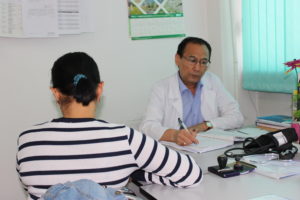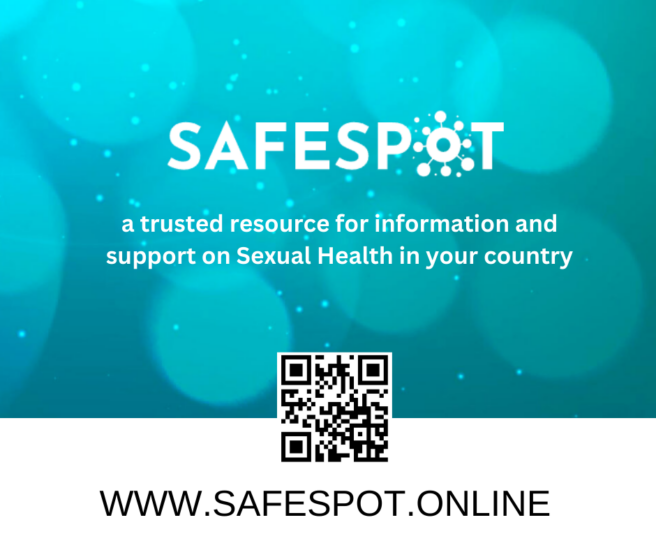
Author: Olga Ochneva, Kyrgyzstan
Valentina from Bishkek, Kyrgyzstan, found out about her HIV-positive status after her stay at the Russian hospital where she had several surgeries. HIV tests were negative before the surgeries. Valentina could not prove the doctor’s fault and returned home with some hope for the fallacy of diagnosis. When her diagnosis was confirmed, the woman received consulting and support from the doctors at the capital’s AIDS centre and started receiving the therapy.
“In the course of these six years, I have got acquainted with other patients, and then started working as a consultant myself,” Valentina is saying. “I can tell from my experience that most people who deny treatment are afraid of their status to be revealed and they lack information. For example, my husband is in jail now and he also has HIV. He does not receive antiretroviral therapy (ART) even though there is such a possibility in jail. Prisoners think that the therapy has severe side effects. I try to convince him, but he continues to refuse without even trying.”
People are afraid of discrimination and self-stigmatization after being diagnosed with HIV. For many years there was an information attack on HIV being a horrible deadly disease, the Deputy Director of the Republican AIDS Center Aibek Bekbolotov says. He hopes that in the nearest future it will be possible to draw people’s attention to the issue and tell them that HIV is a chronic controlled disease and when you are on treatment and have zero virus load, you cannot pass the virus on.
Today, 3,055 people in Kyrgyzstan receive ART. It makes 56% of all patients who are aware of their disease and 35% from the estimated amount of people living with HIV. According to the UNAIDS goals, the country has three years left to achieve the 90% treatment coverage of people diagnosed with HIV.
Not all doctors know about the mark
Khalida’s child was infected during the mass internal hospital infection case in the south of Kyrgyzstan in 2007-2008. At that time, the boy was admitted to intensive care unit because of an insect bite.
“After the scandal with the infection, doctors started mandatory HIV testing of children. My son was seven when he was diagnosed with HIV. We started receiving therapy, even though my husband and mother-in-law were against it. The boy is 12 now, and he is aware of his disease,” says Khalida. “Earlier we went to Osh regional AIDS centre. We currently receive treatment at the regional hospital where we live. In order to get additional treatment, we need to take a referral from the AIDS centre. I know other parents who deny that the diagnosis is written on the medical card. They occasionally meet doctors who do not know about the special mark on the referral and they can ask about the meaning of the mark in front of everbody.”
Decentralization of ART services to the primary level happened in almost all regions of Kyrgyzstan. It has become more convenient for patients to receive the service. Nevertheless, service in small regional hospitals sometimes jeopardizes the confidentiality of the therapy, as we can see with the mark or mentioning HIV openly on the medical card.
“We received several complaints on confidentiality disclosure. There are not many of them, but one or two such cases quickly spread in the community. They can cause distrust in service providers,” notes Aibek Bekbolotov. “On the primary level, the qualification of doctors in these issues is slightly lower, but we are constantly working on improvements in this area.”
The number of ART involved patients grows every year. Since 2012, the patient coverage has increased fivefold. In many respects, this was due to the introduction of WHO recommendations in the country. They expand the indications for the administration of ART therapy and seek to cover the treatment of all diagnosed patients.
30 out of 100 patients stop taking medicines
The indicators of adherence to treatment in the country improve every year. There is a wider range of medicines, which allows to lower the number of pills, the frequency of taking medications and to reduce side effects. Nowadays, about 60% of all patients, who take ART, achieve efficacy in treatment, that is, the suppressing of viral load to an undetectable level.
“Out of 100 patients who are annually connected to the therapy, 20-30 people stop taking medicine during the first six months. This is the most difficult period during which the possibility of side effects is higher,” says Aibek Bekbolotov. “If people continue the therapy for a year, the interruption rate will be no more than 10%. In vulnerable groups, such as drug users and sex workers, there are many everyday worries about finding a livelihood. It is harder for them to continue the treatment because of their life conditions.”
The evaluation of the effectiveness of treatment is carried out twice a year in accordance with the viral load indicators. Doctors interview their patients, look at the regularity of receiving medicines, remnants of medicines, and the general condition of patients.
“It is the regimen. I know that I need to take medicines. It also happens that I can miss a day or two, because I feel really bad after taking them,” says Valentina. “Doctors are not interested in how strictly I follow the regimen. Their job is basically to give out the medicine. I was tested for viral load in April, but I still have not received the results.”
At the beginning of this year there were difficulties with the purchase of test systems in Kyrgyzstan, the deputy director of the Republican AIDS Centre is saying. Therefore, the examination for viral load in the first quarter of the year was practically not carried out. Until 2016, there was only one laboratory in the country where the viral load was determined. Nowadays there are two such laboratories.
In Kyrgyzstan, they always work on the patient adherence to treatment. ART is purchased from the Global Fund. On the state budget, drugs are purchased for the treatment of opportunistic infections. Nearly 50 NGOs in the country work in the HIV sector.




